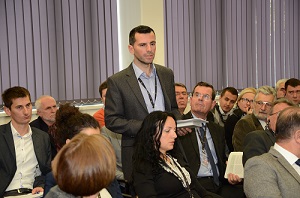
Despite development risks, an intensified cross-sectoral cooperation could have amplified economic benefits for countries of the transboundary Drina River Basin, mainly shared by Bosnia and Herzegovina, Montenegro and Serbia. Basin-wide coordination to prioritize investments, taking into account the trade-offs between economic sectors and the environment, would have multiple benefits. In particular, coordinating the operation of the existing dams in the basin would not only allow for better flood management, but would also improve national energy security, increase electricity export opportunities and reduce annual greenhouse gas emissions in the long term. Coordinating increased energy efficiency throughout the basin should also play a key role in optimizing production and reducing emissions.
These are the main conclusions of a participatory intersectoral assessment in the Drina River Basin, carried out in the framework of the Convention on the Protection and Use of Transboundary Watercourses and International Lakes (Water Convention), which promotes a broad understanding of the benefits of transboundary water cooperation.
The final results of the assessment were presented at a workshop hosted by the Ministry of Foreign Trade and Economic Relations of Bosnia and Herzegovina in Sarajevo from 19 to 20 April 2017. The study in the Drina River Basin, financed by the Italian Ministry of Environment, Land and Sea, and supported by the UNECE secretariat, focused on the water-food-energy-ecosystems nexus ─ the links and impacts between energy, water management, agriculture and environmental protection. The project aimed to strengthen the capacity of the administrations of the three main riparian countries to address intersectoral issues, such as reconciling the differing objectives of energy and water management, and identify mutually beneficial actions to make the current resource management practices more sustainable. Implementation of the actions identified was discussed with the State authorities of the riparians and other key stakeholders, spanning the energy sector, rural development, including tourism, and the management of wastewater and solid waste.
Because of its environmental value, the Drina Basin is well positioned to pioneer green rural development. At the local level, the agricultural sector needs to be modernized in terms of technology and practices, and diversified in terms of production and income. The results of the study show that there are various opportunities to improve the livelihoods of the basin’s population by combining the promotion of local, high-quality agricultural products with nature-related tourism and/or renewable energy production, including from biomass. To realize such opportunities, the participants reviewed a series of measures that could be carried out with transboundary cooperation. Notably, improving enforcement in the management of wastewater and solid waste is key to achieving an improved environmental quality, with many associated benefits. Replication of successful local initiatives and sharing knowledge, also across the borders, is needed.
More sustainable renewable energy development is crucial and should be seen as an opportunity. The study proposes updating the feasibility studies of new hydropower infrastructure and evaluating the impact of the new projects on the basin. Among the proposals is also finding prospects for financing energy efficiency measures and non-hydro renewable energy technologies, such as solar power and biomass which are particularly promising in the basin and can contribute to a better balancing of the system.
Traditionally, organization of resource management is divided along sectoral lines. Therefore, the participants appreciated that the nexus approach applied in the project brought together different sectors and interests in the countries to identify jointly economic development opportunities that integrate environmental protection. Further, the participants underlined the importance of finding mechanisms to continue their fruitful intersectoral transboundary dialogue. One forum that can contribute to better intersectoral coordination is the International Sava River Basin Commission (ISRBC), a co-organizer of the workshop.

